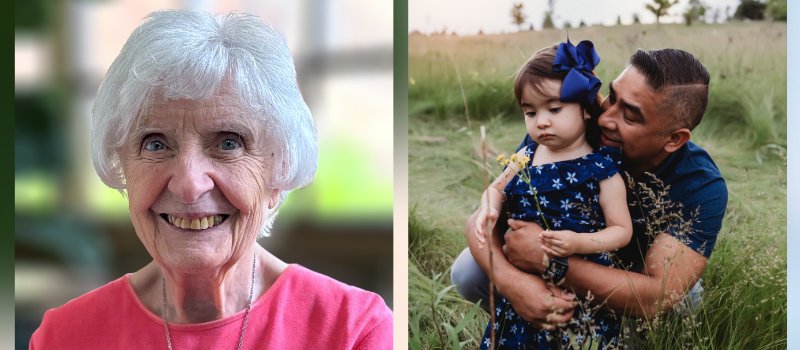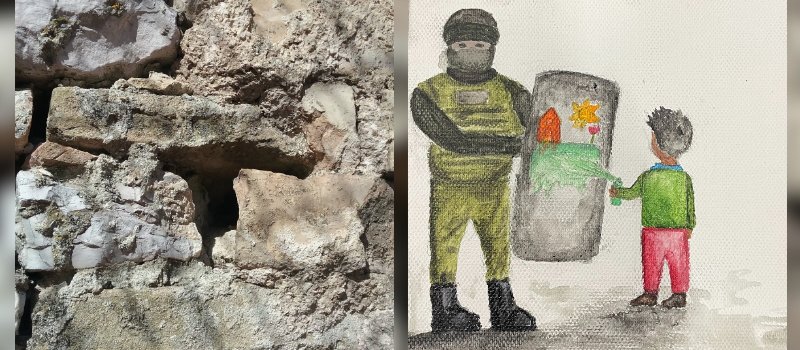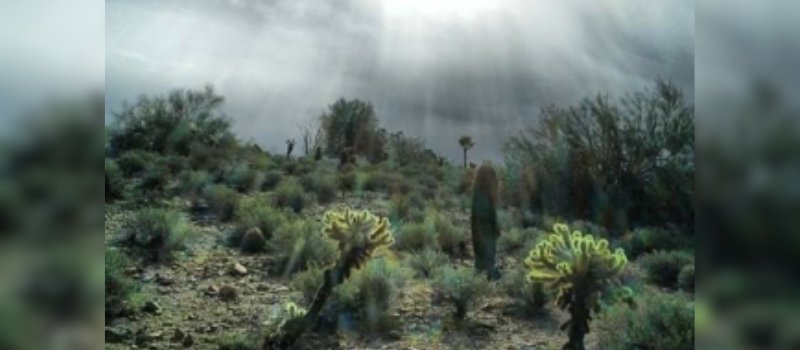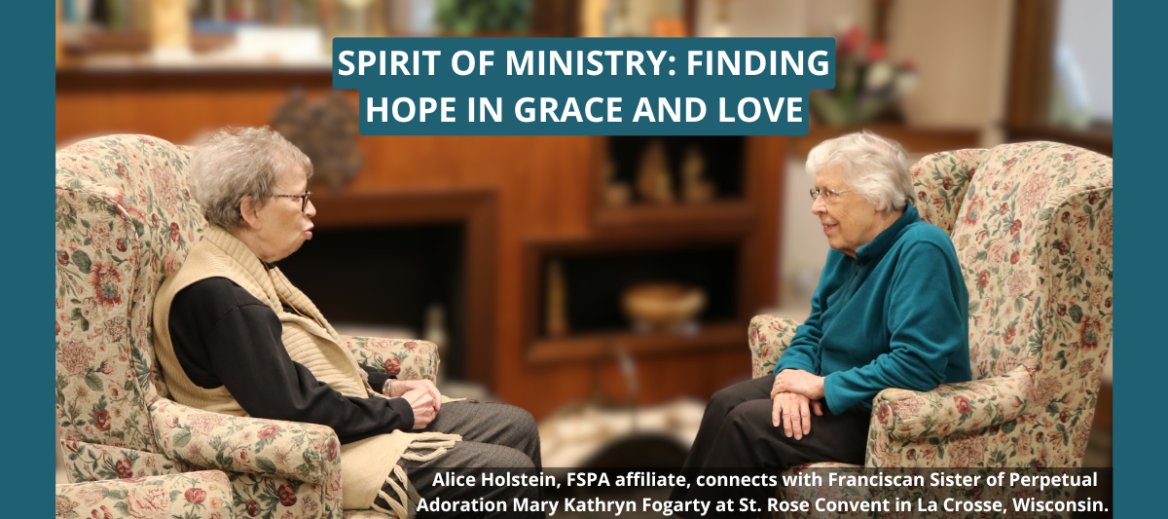By Alice A. Holstein, Ed.D., FSPA affiliate
Before his passing in April, the world was called by Pope Francis to journey this Jubilee Year as pilgrims of hope: “Everyone knows what it is to hope … In the heart of each person, hope dwells as the desire and expectation of good things to come, despite our not knowing what the future will bring.”
The “not knowing” at this time in our history is so far and wide and vast that too many of us feel lonely and lost and abandoned. Yet hope abounds. We are sharing what it means for some in the FSPA community, including Alice Holstein, FSPA affiliate, who has answered “a call to write something that might give hope to others.”
In a world hurting with disappointments, war and uncertainty, hope can make a difference. There are some who don’t believe in it, but for me, hope often comes
when hope seems missing. Despite the disbelievers, hope, for me, is also a multidimensional challenge. The challenge is to shift gears, to devise a different “game,” to reach for new methods, to be there for one another, to process hurts and disappointments, to ask how can I best bear this, to be creative and loving, to consider options and to accept that life is often unfair. It may also push us to find the best in ourselves and others.
I have to admit that I spent some time in darkness before I worked it through. The darkness consisted of some three months of pain and agony which partly included difficulty walking and caring for myself. Some of the time I was literally “trapped” in my apartment, highly dependent upon others. Finally the problem was
diagnosed, leading to back surgery and profound relief. I am back to re-creating my life. Before the relief, however, I began to realize how much goodness I was receiving. It was then I knew that, once again, hope had returned. I was blessed with many who stepped forward to help me cope. I was amazed and grateful.
Some brought food. Some helped change my sheets. Some just checked on me. One bought me a heating pad. Several visited. Two people fetched my daily mail. Several ferried the food I ordered from the Eagle Crest kitchen. A couple took me to urgent care one bitterly-cold night. Another couple stayed with me during the surgery. Five different women helped get me ready for surgery. Several bought groceries for me and a number brought good cheer. Very little of it was planned per se. It was an informal team which just functioned to meet my needs.
My belief is that the state of the world, despite its dark side, can still contain hope for the future. For many, however, there may be the need to first grieve, outward
or inward, the losses. Finding hope in the ashes may be possible only through tears. Crying can be healthy if we do not allow it to severely cripple us. A helpful attitude may be that relief might just look different than what we expected. I especially believe this is true if we can turn to one another for courage, interpersonal generosity and support. Never before have we needed each other more. We can decide to value more of these qualities instead of depending so much on
external resources or riches. We can all become more responsible for goodness. This may require new forms of collaboration and more knitting together of community resources. Whether it be coping with emotional, financial or neurological vulnerability, many might need help.
I can even see a future for creation if we become a more conscious vehicle for love and support amidst the so-called “bad news.” In my case, I was cared for by an
unorganized team of people. Perhaps similar needs could be served by more formal teams.
It is appropriate to question what the lessons are. What are the gifts? How can we turn tragedy into growth? In what ways can we help others? Will listening carefully make a difference in assessing needs and solutions?
What you do and say in the world can make a difference. Each of us could look for things, large and small, such as volunteering, finding a cause, simply sharing a heartfelt greeting or being with someone when they are in need. Soulful listening can make a huge difference in someone’s coping skills. Sometimes soulful listening needs to take place in the form of writing. What matters is that the person knows they have been “heard” and supported. Yes, I know that letters are not in vogue, but that’s the point. They are special enough to be treasured. Surely an email is possible.
The practice of exchanging emails is one I practice daily. I also make weekly phone visits. These people I reach out to, especially since I live alone, keep me feeling very alive; that I am both a caring person and a person cared about. The subjects vary greatly, mostly about how and what we are doing and thinking about. We are all in need of more hope in our inner and outer lives. Being responsible for that in very active ways can make a surprising difference.
Besides the email sharing, my informal team helped me survive my crisis with grace and love. These gestures, in turn, encouraged me to answer a call to write something that might give hope to others. Hope can be contagious!
There are so many pilgrims of hope in the midst of FSPA: people journeying through the not-knowing and sharing their inspiration to be grace and love to others along the way. We have been gifted with these perspectives of hope to share.
Franciscan Sister of Perpetual Adoration Maria Friedman
“Hope is the impulse in my soul reminding me, when I feel a tiny, an ordinary or a humungous need, that I have the wherewithal to allow good to happen. Hope
is the impulse in my soul reminding me that however challenging a situation is, good can happen. Hope is the glimmer of light, deep in my soul, that has the ability to grow to whatever size necessary for a current situation.”

Julio Vera, Prairiewoods Franciscan Spirituality Center massage therapist
“Hope has been a constant throughout my life, increasing in intensity each day with opportunities to hope given by God. Seeing my toddler learn and grow with new opinions and phrases gives me hope for the bright path she will walk in life. Family meals around our dinner table bring moments of connection, communication and joy that encourage hope for many years of happiness and love in our future. When I finish a massage, helping a client through a pain that has been hindering their ability to experience life to its fullest, I am happy to know I created a positive impact; hopeful for where my career can take me and who I can help in the future. I am thankful to God for each opportunity to find hope in seemingly small moments that in turn create a huge impact.”
Madalene Buelow, FSPA affiliate and prayer partner
“These words and phrases about hope guide my weekly chapel prayer hour:
H – Heightened awareness to remain faithful to my God and my true self.
O – Openness to calls of unity.
P – Perseverance: Making change happen in small ways.
E – Experiencing agape: The unconditional love of all creation.”

Patricia Roth, FSPA donor and partner in mission
“Spirituality essentially IS hope — hope that there is something more and greater. Hope that, at the end of the day, there will be rest; and that, at the end of the journey, the wide doors will swing open. ‘Welcome home.’”
FSPA ministry grant partner, Eastern Iowa Health Center, Cedar Rapids, Iowa
“Hope is built upon grit and determination, hurt and fear, sadness and despair,” shares Eastern Iowa Health Center Director of Development and Community Outreach Stacie Eastman, “but it is because of this that we inch towards the light, always searching for the path that leads to illumination. Sometimes we crawl towards that light, but we continue because we are all seeking to not be a part of the darkness. Determination fuels us. Despair challenges us. Hurt rebuilds us. Hope inspires us. And love … love transforms us.”


